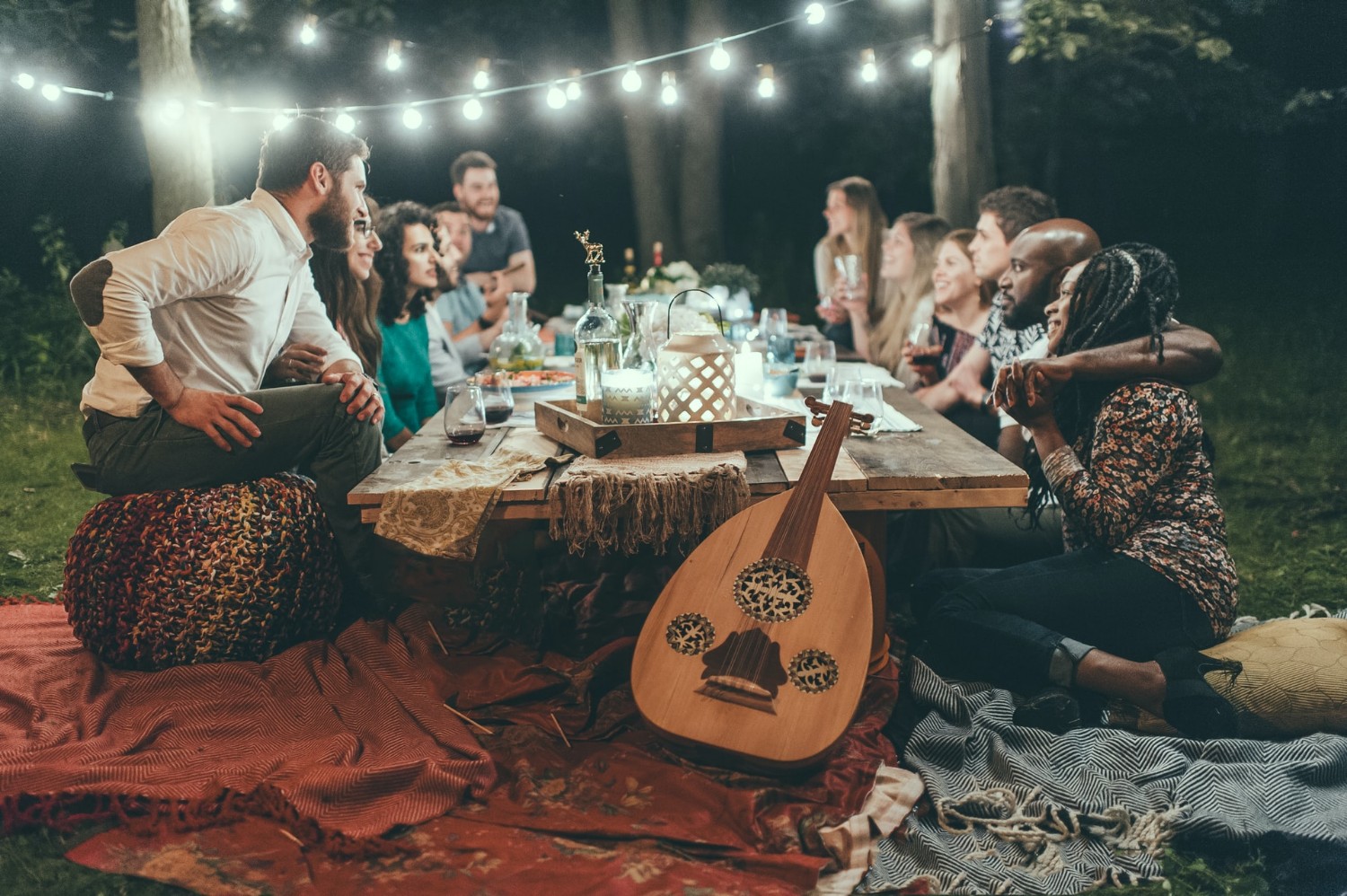Most of the posts Fran and I share here at Gum on My Shoe are about mental health, which is one of the core themes of our blog. The other theme is mutually supportive friendship. Being able to talk with your friend about their mental health and yours is foundational, but it’s just as important to spend time together that isn’t focused on whatever you might be going through at the time.
Sharing quality time reinforces your friendship, builds memories, and reminds you both that you value each other’s company in fine weather as well as in stormy times. Plus, of course, it’s just really good fun! Here in no particular order are ten ways I enjoy spending time with Fran and other friends.
1. Read to Each Other
We don’t do it as much as we used to, but Fran and I love reading together. More accurately, we love me reading aloud to Fran on our video calls. Our reading list has included fiction and non-fiction titles, including the McCabe and Savage series of thrillers by Maine author James Hayman, Donna Tartt’s The Goldfinch, and Outlander by Diana Gabaldon. The last book we read together was The Isolation Artist by award-winning arts writer Bob Keyes, about the life and death of American artist Robert Indiana.
Whatever the subject matter — I’ve read short stories, blog posts, and news articles to Fran as well as the longer books and series — there’s something very cosy and intimate about reading aloud to someone, or being read to. Give it a go sometime!
2. Do Something Creative Together
Despite living three thousand miles apart, Fran and I have written two books together. Maybe writing isn’t your thing, but if you and your friend share creative interests, getting together to discuss or work on your projects can be a very satisfying way to cement your friendship.
My friend Aimee blogs at I’m Not Disordered, and our mutual interest in blogging is an important aspect of our friendship. Whether we’re struggling with ideas, planning a new article or collaboration, asking for advice, or simply sharing what we’re working on at the moment, it means a lot to have someone who understands what we’re trying to accomplish. We also share an interest in creative journaling and scrapbooking, and sometimes get together to work on our current projects, whatever they might be.
3. Watch TV Shows and Movies
This might seem too obvious to include. Don’t friends do this anyway, whether they have mental health issues or not? Perhaps, but as with many of the activities I’m suggesting, it’s easy to overlook the value of “chill out time” spend with a friend. This might include going to the cinema together if your friend lives locally, but it’s easy enough to share screen time online.
Fran and I meet pretty much every day to watch movies or TV series together. We open a Skype call with me on my PC or tablet and Fran on her laptop. She brings up Netflix on her TV and turns the laptop so I’m facing the screen and can watch along with her. We’ve watched many different movies and series like this, as well as sporting events such as the Superbowl and Triple Crown horse races.
My friend Jen also lives in the US, and we’ve met online a few times to watch her favourite TV show, Northern Exposure. She gifted me the first season on DVD and I played it on my PC, sharing the screen with her on our video call. It was lovely to be able to share something that means so much to her. I rarely go to the cinema but I enjoy visiting Aimee for movies and takeout. “Netflix and pizza” has become synonymous for quality time together and is something we both look forward to.
4. Go For a Picnic
Not everyone might agree but in my book it’s hard to beat going for a picnic with a friend! Aimee and I planned a picnic day in Morpeth a few years ago, which was a great success. We also picnicked in Aimee’s garden in April 2021 as England emerged from lockdown; you could meet up with people again as long as it wasn’t indoors.
Picnics are arguably harder to arrange if you don’t live locally. I don’t recall Fran and I sharing a picnic virtually, but we’ve arranged video calls to share a drink many times, in our respective homes or when out and about. One occasion I remember with great affection was a video call with Fran and her friend Tracy. I was in the beer garden of a lovely pub in Ambleside in the English Lake District while they were having a drink at the Monhegan Brewing Company on Monhegan Island in Maine. It was a lot of fun, made all the more hilarious by the various video filters we played around with!
5. Plan a Trip
Fran loves traveling and over the years I’ve accompanied her virtually on trips all over the world. A big part of my travel buddy role is helping Fran plan for her excursions. Amongst other things, this involves looking for flights and accommodation, things to do when she gets where she’s going, or working with her on her packing lists. On a smaller scale, I love planning local days out with friends, whether that’s day trips with Aimee to Edinburgh and Durham as we did last year, or drives out for lunch with my friend Vikki. The latter are a real treat for me as I don’t own a car, so I get to go places I wouldn’t otherwise be able to visit easily.
Planning time to celebrate birthdays, the anniversary of your first meeting as friends, your successes and achievements, or other special occasions counts too. It doesn’t need to be big or expensive: a simple meet up for coffee or a drink reminds you both that you value the pleasure of each other’s company. Some of my fondest memories with friends have been when we’ve met to mark our respective birthdays and successes, such as Aimee’s blog achievements or Vikki’s return to university a few years ago.
6. Have a Music Night
It’s great to share music with friends, whether virtually or in person. Jen and I love sharing songs when we’re online together, taking turns to suggest our favourite tracks and artists. Even when I’m listening to music on my own, I often post YouTube links to my Facebook page so other friends can listen along if they choose to. It’s a great way to connect with other people with similar (or indeed widely different) musical tastes.
It’s been a long time since I attended a live gig or concert, but I have great memories of listening to music — and singing and dancing along! — at Stack Newcastle with Vikki, and open mic nights at Bar Loco. I’m sad that Stack is about to close, but I will be keeping an eye — and an ear — out for other live music venues.
7. Take a Walk Together
As I’ve written previously, walking has always been an important part of my life. Even when I’m walking on my own, I love to share the experience with friends. This was especially valuable during lockdown, when I shared my daily walks for exercise with Fran and other friends via voice or video calls. Whether it was cows or horses in the fields (“Look! Horsies!”), the peace and quiet I found beside the Ouseburn stream, or the wonderful — and hope-full — garden fence mural I passed almost every day, sharing my walks enhanced my appreciation of my local area, and provided something to talk about with my friends beyond the realities of life under lockdown.
Fran shares walks with me too. I especially remember following her on a walk around Sitges, near Barcelona in Spain. We chatted as she explored the old town and seafront, and I followed her location using Glympse and Google maps. In a similar way, Fran used to share her walks around Peaks Island where she lived at the time. In-person walks with Aimee through Carlisle Park and up Ha Hill in Morpeth, and an urban ramble around Newcastle last year with my friends Paul and Fiona are further examples. Health-wise, I find long walks more challenging than I used to, but I look forward to many walks with friends in the future.
8. Share Quiet Time
So far, my suggestions have involved doing things, but it can be just as valuable to do nothing — or very little — with your friend. Whether it’s meditating together, sharing companionable silence because you’re tired or otherwise occupied, or even dozing off with your friend, quiet time brings its own reward.
9. Get Up On the Stage
It won’t be for everyone but watching your friend perform, or having your friend’s encouragement and support while you do, is a wonderful thing. I’m by no means a natural on stage but I’ve performed live readings of my poetry and excerpts from High Tide Low Tide, and it was particularly meaningful to have Vikki in the audience on a few of those occasions. Likewise, I’ve watched Vikki and other friends on stage in pantomime, karaoke, and open mic sessions. I’ve also been there to support Aimee speak at a number of events, including one for World Mental Health Day in 2019. Whatever the event, there’s nothing like applauding your friend for their courage and talent, and being applauded in turn for yours.
10. Volunteer Together
I’ve mentioned Vikki and Aimee a lot in this article (I don’t have many local friends!) but they get another shout-out here because I met each of them through volunteering with the mental health charity Time to Change. I’ve enjoyed volunteering with them and other friends at a number of events, including Pride and a Halloween fundraising event for Newcastle Recovery College. It’s a great way to meet new people and get outside your comfort zone for a little while. The prime example of that for me was volunteering to zip-line from Newcastle’s mighty Tyne Bridge to raise funds for homelessness charity Crisis.
Likes and Dislikes
In this article I’ve shared ten ways I’ve found to share quality time with friends that don’t involve talking about our mental health. That’s not to say no such conversations ever occur while we’re doing these things, because sometimes they do. That’s perfectly natural, but the point is we’re sharing time regardless of whatever might be going on for us, for the simple pleasure of each other’s company.
It’s worth mentioning, however, that sometimes our mental health might influence the activities we feel able to do, whether due to triggers, anxiety, stress, or other factors. Be aware of that when planning activities with your friend, and be open to the possibility that plans may need to change, be postponed, or even cancelled. Mental health aside, we all have different likes, interests, and preferences. Not everyone would enjoy a crowded music venue, for example, even before the pandemic. Likewise, going for a four hour walk or volunteering would not be to everyone’s taste.
Talk with your friend about what they’d like to do together, and be creative about the possibilties. If Fran and I can do this, living as we do on opposite sides of the Atlantic Ocean, I’m confident you and your friend will find plenty of things you can do too!
Over to You
What do you and your friends enjoy sharing? In what ways does it help build your friendship? Do any of the things I’ve suggested appeal to you? We’d love to hear your thoughts so do get in touch, either in the comments below or through our contact page.
Photo by Valiant Made on Unsplash.




